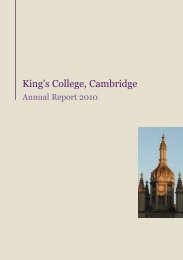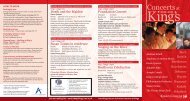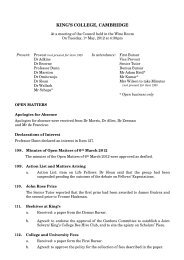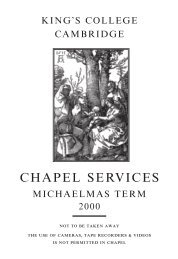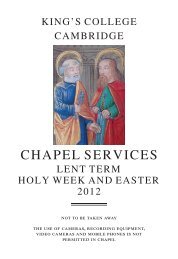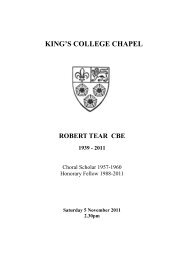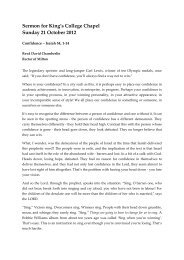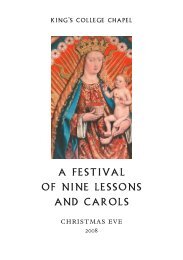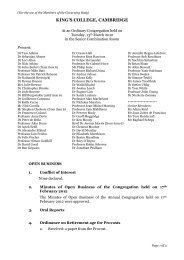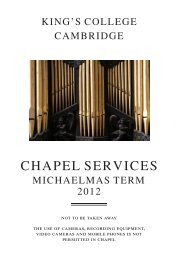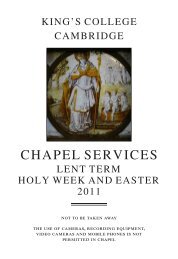Part 2 (Obituaries) - King's College - University of Cambridge
Part 2 (Obituaries) - King's College - University of Cambridge
Part 2 (Obituaries) - King's College - University of Cambridge
You also want an ePaper? Increase the reach of your titles
YUMPU automatically turns print PDFs into web optimized ePapers that Google loves.
72<br />
OBITUARIES<br />
started at Cuddesdon Theological <strong>College</strong>. It was decided that he should stay<br />
at Cuddesdon for a year only, and then a year in a town parish to gain some<br />
experience <strong>of</strong> normal clerical life before taking up the Fellowship at King’s.<br />
Christopher became acting curate at St John’s Newcastle, and then war<br />
broke out.<br />
Christopher was due to be ordained priest in December 1939, but found to his<br />
great dismay that he was not prepared for this step; he had serious problems<br />
with the doctrine <strong>of</strong> the Eucharist that he had been taught. What is more he<br />
found that at King’s his role was to create an emergency aid post in a building<br />
unequipped with running water. In the unnatural quiet that had fallen on the<br />
<strong>College</strong> he decided to take up a post teaching Classics at Eton. One advantage<br />
was that at Eton he tumbled to the obvious fact that great numbers <strong>of</strong> fellow<br />
Anglicans could serve happily as priests without binding themselves to<br />
regarding the Eucharist as more than a symbolic action to commemorate<br />
Christ’s sacrifice. He was ordained priest in December 1943. He returned to<br />
King’s towards the end <strong>of</strong> the war, but his post proved undemanding, with few<br />
pupils as King’s was disinclined to admit theologians.The most important thing<br />
he did was attend enthralling seminars led by C H Dodd, and to begin<br />
philosophical work on relating theology to the logical empiricism that was<br />
gradually emerging in the wake <strong>of</strong> Wittgenstein, Austin, Ryle and others.<br />
A visit to Germany with a party <strong>of</strong> British theologians to meet and encourage<br />
their opposite numbers, organised by the Foreign Office and the Control<br />
Commission in 1948, was the first <strong>of</strong> a series <strong>of</strong> such that brought Christopher<br />
into contact with academic life in Germany, where theology was taken much<br />
more seriously, and where he learnt to speak and write in German.<br />
In 1949 he became Chaplain and Tutor in Theology at Keble <strong>College</strong>, Oxford<br />
– as he put it, the Warden had appointed the most nearly Protestant Chaplain<br />
in the history <strong>of</strong> the <strong>College</strong>. His first published work was an essay in a volume<br />
titled Faith and Logic (1957), but he was becoming dissatisfied with the<br />
textbooks he had to use in teaching the early history <strong>of</strong> Christian doctrine, and<br />
began to work on the philosophical background to the doctrinal controversies<br />
<strong>of</strong> the Fathers.



